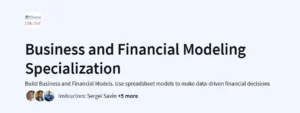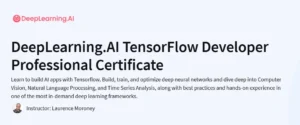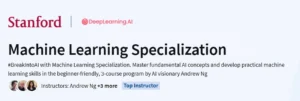What will you learn in this AI for Medicine Specialization Course
Diagnose diseases from X-rays and 3D MRI brain images using convolutional neural networks (CNNs).
Predict patient survival rates more accurately using tree-based models.
Estimate treatment effects on patients using data from randomized trials.
Automate the task of labeling medical datasets using natural language processing (NLP).
Program Overview
AI for Medical Diagnosis
⏳ 20 hours
- Learn to create CNN-based image classification and segmentation models to diagnose lung and brain disorders.
AI for Medical Prognosis
⏳ 29 hours
- Build risk models and survival estimators for heart disease using statistical methods and random forest predictors.
AI for Medical Treatment
⏳ 22 hours
- Develop treatment effect predictors, apply model interpretation techniques, and use NLP to extract information from radiology reports.
Get certificate
Job Outlook
Equips learners with practical skills applicable to roles such as AI Engineer, Data Scientist, and Machine Learning Engineer in the healthcare sector.
Provides hands-on experience with medical imaging, prognostic modeling, and treatment effect estimation.
Enhances qualifications for positions requiring expertise in applying AI to medical data analysis.
Specification: AI for Medicine Specialization
|
FAQs
- No prior medical knowledge is required.
- Suitable for data scientists, AI enthusiasts, and healthcare professionals.
- Focuses on applying AI techniques to medical datasets.
- Step-by-step guidance helps learners understand medical imaging and prognosis modeling.
- Encourages hands-on practice with real-world medical data.
- Prepares learners for roles such as AI Engineer, Medical Data Analyst, and ML Engineer.
- Provides experience with diagnostic imaging, prognosis modeling, and treatment effect prediction.
- Enhances employability in AI-focused healthcare organizations.
- Builds a portfolio of projects using real medical datasets.
- Equips learners with practical skills for healthcare AI problem-solving.
- Python programming environment for data analysis and model building.
- Libraries such as TensorFlow, PyTorch, and scikit-learn.
- Access to medical imaging datasets and NLP tools for practical exercises.
- No advanced or proprietary software is required.
- Step-by-step instructions provided for setup and usage.
- Regular hands-on exercises with CNNs, tree-based models, and NLP applications.
- Practice using real-world medical datasets to build diagnostic and prognostic models.
- Review project outcomes to refine model accuracy and interpretation.
- Apply treatment effect estimation techniques in practical scenarios.
- Continuous practice ensures confidence in applying AI to medical problems.
- Explore advanced topics in deep learning for medical imaging and multi-modal datasets.
- Study reinforcement learning for treatment optimization.
- Join healthcare AI communities for collaboration and mentorship.
- Experiment with real-world datasets and research projects.
- Build a professional portfolio to enhance career opportunities in medical AI.





